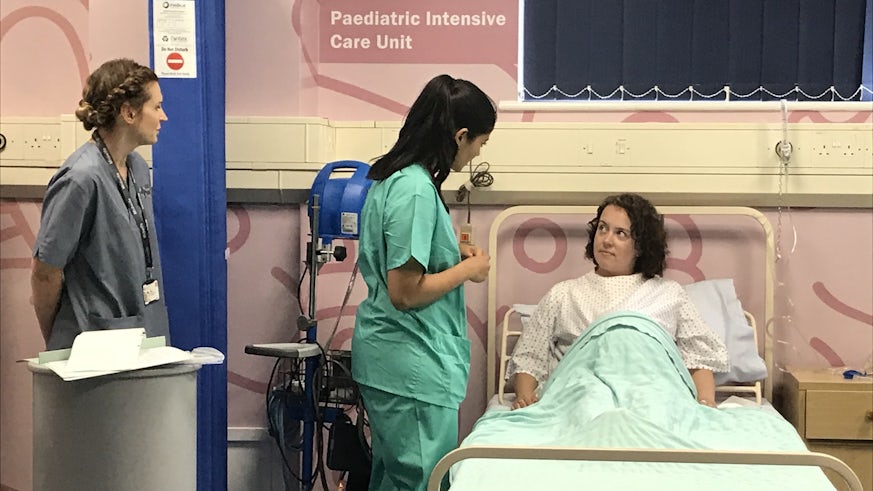Project Sepsis host simulation event on World Sepsis Day
16 September 2019

Project Sepsis, Cardiff University, along with clinicians from the University Hospital of Wales (UHW), ran a simulation event entitled ‘Sepsis: a spotlight on what can happen to mum and baby’ to mark World Sepsis Day.
Sepsis is a life-threatening condition that can affect anybody at any age however, it is more common in vulnerable populations such as the very young and very old. It is a condition that is extremely difficult to diagnose as symptoms can be very subtle. If left untreated, it can cause the loss of life within hours.
The aim of the event on Friday 13 September was to raise awareness of the significance of sepsis during pregnancy. Attendees, after being welcomed by Professor Peter Ghazal, witnessed a simulation performed by a clinical team led by Dr Simran Sharma from UHW, about a true story of a mother and baby who were severely affected by sepsis.
The mother in question, Amanda Hawkes, then gave a talk about her experience - providing an insightful first-hand account of what it was like to be diagnosed with sepsis 32 weeks into her pregnancy.
The afternoon was a demonstration of successful collaborative working between Cardiff University and clinical practice staff and was a fantastic opportunity to raise awareness and to engage the public.
The work of Project Sepsis was also picked up last week by the BBC with coverage on Newyddion 9, S4C, BBC radio Wales and on BBC Wales online.
About Project Sepsis
Project sepsis is a research collaboration across medicine and science disciplines that addresses an urgent medical need for recognising and accurately detecting infection underlying sepsis. It uses computer-assisted genome, proteome, and metabolism approaches to decode the communication from the blood-immune system to more rapidly detect infection and identify innovative treatments

Speaking last week about the next steps for Project Sepsis, Professor Peter Ghazal said:
“The research and work we’ve carried out over the last sixteen years and which has been done with hundreds of patients, has been a proof of concept. What we need to do now is to move this work into clinical validation - to find out if we were to use our method as a diagnostic test, whether it would dramatically improve the outcomes of patients.
Our aim now is to work with the wider community and to facilitate as fast as possible any potential test that can be introduced into a clinical setting. We’re very excited and think this could be achieved within five years. The current test takes days and in 85% of cases, fails. What we are proposing as a test could take minutes or hours – it could therefore add a really important tool in the armoury of physicians to enable them to identify sepsis, to make the right decisions and to give the right medication to patients.
Project Sepsis is a community in action. It involves many disciplines within medicine, within science and the whole community. Really important to our work is our lay advisory group which has been fully involved and has been shaping the way in which we will move forward in the future.”

